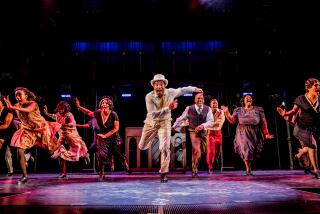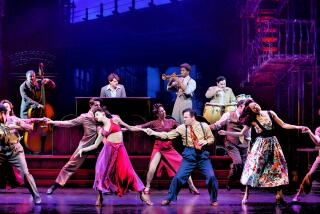MUSIC REVIEW : Swados’ ‘Jerusalem’ Given West Coast Premiere
- Share via
Jerusalem is a city of holiness and hate, where both spiritual aspirations and factional violence are concentrated and fueled by ethnic and religious differences.
“Jerusalem” is a monologue for the town, whose inhabitants sing and speak not as individuals but as musical blocks in a timeless, organic city. It welds 14 languages and equally diverse popular musics into a single, passionately earnest, manic-depressive voice, crying for peace and understanding.
For want of a better term, Elizabeth Swados calls her creation an oratorio. For want of daring--foolhardy?--producers, a West Coast audience heard the 1984 work for the first time Sunday evening at the St. Joseph Center in Orange, courtesy of music director Alan Weiner and the Friends of Jewish Music.
The quasi-dramatic structure of the work is simple enough, bringing a youthful prophet Jeremiah on a tour of a modern fantasy Jerusalem, where the musical blandishments of marketplace and ethno-religious quarters are interrupted by bursts of snare-drum machine-gun fire.
Musically it is far from simple. Swados makes no effort to blunt ethnic edges, allowing instead the heady juxtaposition of a broad range of Middle Eastern music, American popular music from soft rock to a gospel version of “Amazing Grace,” and touches of low-budget Sondheim in the set pieces. The frequent appearance of chaos, one suspects, is not deceptive.
Swados’ direct compositional contribution seems to have been the creation of the formal framework, within which much ethnic improvisation takes place, and short songs and ensembles on texts from Jeremiah and the modern poet Yehuda Amichai. The frame, though, is versatile and well-shaped, anchored and directed by the songs.
Casting, then, is crucial--this is not an oratorio for the average chorus, be it ever so accomplished in Western traditions. Weiner gathered a multicultural ensemble, convincing in matters of ethnic authenticity though widely varied in musical and dramatic skills.
“Jerusalem” is very much an ensemble work. With larger forces, there might be greater distinction between soloists and chorus, but almost everyone in Weiner’s group of 19 had opportunities for individual glory, and proved indispensable to the whole.
Given the nature of Swados’ score, strict professionalism is not required of the singers, and paradoxically could prove limiting. Weiner’s cast presented an engaging and moving sense of naturalness, a simple confluence of real people in a not-so simple time and place.
The dramatic bits, however, directed by Bob Sykes, suffered from staginess. The pro forma religious confrontations or the gleeful descriptions of weaponry seemed overtly theatrical touches, jarring in an otherwise spontaneous context, and the choreographed chorus mime in “All Day We Work” trivialized the subject of unrewarded labors.
Musically, Weiner paced the work carefully. He lead a small pit combo in suitably sparse, percussion-rich accompaniment, doing justice to both the full production numbers and the more characteristic moments of poignant, expressive reflection and sorrow.
The small, talkative audience proved distracting, and the production managed to seem small without real intimacy. The personable cast, however, sustained interest in this unique vehicle. They get another chance tonight at Gindi Auditorium of the University of Judaism.
More to Read
The biggest entertainment stories
Get our big stories about Hollywood, film, television, music, arts, culture and more right in your inbox as soon as they publish.
You may occasionally receive promotional content from the Los Angeles Times.










